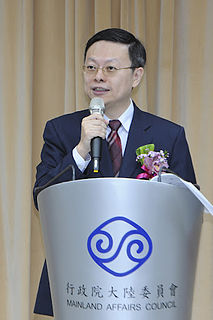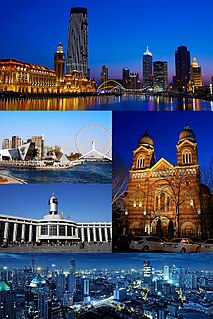
Koo Chen-fu, also known as C.F. Koo, was a Taiwanese businessman and diplomat. He led the Koos Group of companies from 1940 until his death. As a chairman of the Straits Exchange Foundation (SEF), Koo arranged the first direct talks between Taiwan and mainland China since 1949 and served as Taiwan's negotiator in both the 1993 and 1998 Wang-Koo summit.
The "1992 Consensus" or "Consensus of 1992" is a political term coined by Kuomintang (KMT) politician Su Chi, referring to the outcome of a meeting in 1992 between the semi-official representatives of the People's Republic of China (PRC) in mainland China and the Republic of China (ROC) in Taiwan.

Chen Deming is a former the President of Association for Relations Across the Taiwan Straits of the People's Republic of China.

Wang Daohan, was the former president of the Association for Relations Across the Taiwan Straits (ARATS).

Cross-Strait relations or Taiwan–China relations, Mainland–Taiwan relations refer to the relationship between the following two political entities, which are separated by the Taiwan Strait in the west Pacific Ocean:

Chen Yunlin was the chairman of the Association for Relations Across the Taiwan Straits (ARATS), the body responsible for negotiations with Taiwan in the People's Republic of China in 2008-2013.
The Economic Cooperation Framework Agreement (ECFA) is a preferential trade agreement between the governments of the People's Republic of China and the Republic of China that aims to reduce tariffs and commercial barriers between the two sides. The pact, signed on June 29, 2010, in Chongqing, was seen as the most significant agreement since the two sides split after the Chinese Civil War in 1949, since neither government recognize the other as "countries". It was expected to boost the then-current US$197.28 billion bilateral trade between both sides.
The Second Chen-Chiang summit was part of a series of the Chen-Chiang summit of cross-strait meetings. It was the first major meeting between the Association for Relations Across the Taiwan Straits (ARATS) and Straits Exchange Foundation (SEF) leaders in Taiwan. The meeting lasted from November 3 to 7, 2008 in Taipei, Taiwan.

The Cross-Strait high-level talks are a series of meetings between
The Fourth Chen-Chiang summit was part of a series of the Chen-Chiang summit of cross-strait meetings held at Taichung, Taiwan. It was a meeting between the Association for Relations Across the Taiwan Straits (ARATS) and Straits Exchange Foundation (SEF).
The First Chen–Chiang summit was the first of a series of what would later become the Chen-Chiang summit of cross-strait meetings. The meeting was held between the Association for Relations Across the Taiwan Straits (ARATS) represented by Chen Yun-lin and Straits Exchange Foundation (SEF) represented by Chiang Pin-kung. This meeting followed the 1993 Wang-Koo summit.
The Wang–Koo summit was an attempt at a cross-strait meeting that took place in 1993 with some follow up meetings up to 1998 between Association for Relations Across the Taiwan Straits (ARATS) chairman Wang Daohan and Straits Exchange Foundation (SEF) charman Koo Chen-fu.

The Fifth Chen–Chiang summit (第五次陳江會談) was part of a series of the Chen-Chiang summit of cross-strait meetings between China and Taiwan. It was held between the Association for Relations Across the Taiwan Straits (ARATS) represented by Chen Yun-lin and Straits Exchange Foundation (SEF) represented by Chiang Pin-kung.
The Sixth Chen–Chiang summit is the 6th part of the Chen-Chiang summit of cross-strait meetings. It is held between the Association for Relations Across the Taiwan Straits (ARATS) represented by Chen Yun-lin and Straits Exchange Foundation (SEF) represented by Chiang Pin-kung.

Lin Join-sane is a Taiwanese politician. He was the Chairman of the Straits Exchange Foundation from 27 September 2012 until 20 May 2016.

Wang Yu-chi is a politician in the Republic of China (Taiwan). He was the Minister of the Mainland Affairs Council (MAC) of the Executive Yuan since 28 September 2012 until 16 February 2015, when he resigned over the dropping of espionage charges brought against Chang Hsien-yao. Wang is the first ROC ministerial-level government official to visit Mainland China after the end of the Chinese Civil War in 1949.

Chang Hsien-yao or Vincent Chang is a Taiwanese politician. He was the Special Deputy Minister of the Mainland Affairs Council of the Executive Yuan in September 2013 until August 2014 and concurrently as the Vice Chairman and Secretary-General of the Straits Exchange Foundation (SEF) in February 2014 until August 2014.

Kao Koong-lian is a politician in the Republic of China. He was the Vice Chairman and Secretary-General of the Straits Exchange Foundation (SEF) from 2008 to 2014.
















